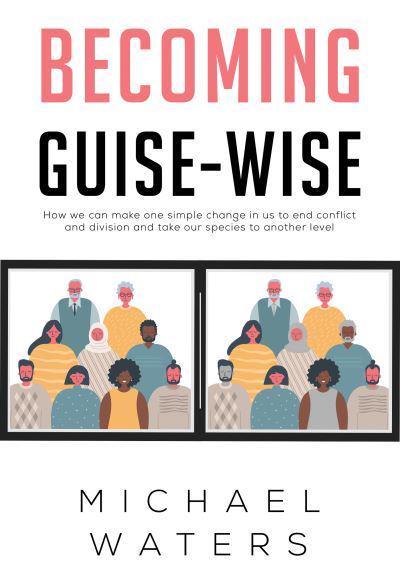
“You don’t get people to love by telling them to love. You create the conditions for love by getting people to see their commonness with others and to lose the fear that comes from seeing the strangeness of others,”

Dr. Michael Waters, who, if you don’t know already, is an established author with many business books under his belt. Dr. Michael is an advocate for change – and also happens to be a great guy!
Dr. Michael gave us some insight into his latest book, “Becoming Guise Wise” which is a useful reference for managing and improving relationships, personal, work, business and internationally – and is recommended reading on conflict resolution for anyone working in HR or management.
This is not some hippy lecture on the need to ‘be kind’, it offers simple yet profound insights into how humanity can end division and resolve conflict, both at a personal level and at every other level – insights that can improve our relationships, at home and with co-workers, insights that can be put into practice by business and political leaders and yet so simple that teachers can even use them to help children communicate better.
It’s all about seeing past the lens of conflict and difference to recognise what we have in common – making that the starting point. Here’s what Dr. Michael told us:
Why is ‘being guise-wise’ particularly relevant now?
In truth, we’ve always needed to be guise-wise. Had we been, the whole of human history and human experience would have been utterly different. Conflict would have been minimal and neighbourliness evident everywhere.
But being guise-wise is an even more essential for the present time. One reason is the scale at which we are able to cause damage and destruction, including through the technologies of warfare and the internet. Would Putin have sent his troops into Ukraine had he truly seen its people as Russians in another guise? Would American society be so dangerously polarised if Trump lovers and Trump haters recognised themselves in one another? If we were guise-wise, would social media platforms seethe with hateful postings?
Tackling global warming and the massive problems it will cause (including mass migrations) needs our species to see itself as one and to work as one. This can only be done with the commonality-first mind-set behind being guise-wise.
With diversity and personal identity being so high on the agenda now, we also need commonality-led thinking to remind us that what we all share is ultimately greater and more important than the things that differentiate us.
What problems will being guise wise solve?
It will help to solve or dissolve most of the problems that have bedevilled our species forever: conflict, division, separation and hostility at every level, tribal and ethnic rivalries, wars, feuds, demonization and dehumanisation of the “other”, interpersonal fall-outs, and lack of neighbourliness.
Being guise-wise will also make us more inclined to tackle the hurts and needs of other groups because we will no longer feel indifferent to or threatened by them.
As for business organisations, guise-wise staff will work together better, minimise unnecessary conflict, rivalry and the “noise” of gossip and bad-mouthing, and better appreciate what connects them all.
What motivated you to write the book?
Once I realised that there was something specific that each one of us could do to radically improve relationship issues at every level, I felt I had to make this known.
At the risk of sounding messianic, it felt as if I was being entrusted with a message that could change everything for the better. That message wasn’t the realisation of our oneness, the message that we human beings share more than we don’t share; many people have this realisation. Rather, it was the insight into the mechanism by which this could become a reality: ie a shift in our response default, from “first notice how others are different” to “first and foremost notice commonality”. It was also the realisation that this new habit could only be acquired through insistent repetition: ie by asking. “What’s common between me and you, us and them?” at every opportunity. The need to share these precious, simple-profound insights are what motivated me to write Becoming Guise-Wise.
Who did you hope would benefit from reading it?
Everyone!
Becoming guise-wise, recognising that you/them are me/us in another guise, and having this as our primary response to others, cannot but be a huge benefit for us all.
It can be even more crucial for leaders and influencers to be guise-wise because they impact the thinking and actions of many others. Since it is easier to become guise-wise if we don’t have to change (overcome) the deep-seated difference-first default, then parents and teachers are especially important. I really want them to try to become more guise-wise so that they help their children to establish the commonality-first mind-set from the very start.
I also want anyone involved in making and implementing relevant policies and procedures to read the book so that commonality-first informs their thinking. Politicians, community leaders, business leaders and HR directors would be four such groups, but there are many others.
Do you think the recent Conservative government situation plays on the thinking from your previous book, The Power of Surge? What might Surge Thinking have recommended?
Any government, just as any business or any other type of organisation, always needs to be Surge Savvy and to be Surge Ready – ie able to respond rapidly and robustly to situations and to achieve big things quickly. These are matters I deal with in the book. There was very little surge-like about the demise of Boris Johnson’s premiership, except at the very end. For months he lurched forward in states of deafness and denial. For many in both the Tory party and the country, this was anything but surge-savvy.
Why was Johnson’s decision making not surge-savvy? My guess is that his own internal voice, the voice that told him to plough on regardless, was stronger than the voices of those urging him to call it a day. Hence, no rapid and robust resignation.
Interestingly, what could have dragged out the decision-making process – weighing the pros and cons of staying or going – very probably didn’t figure significantly. It’s the process most people go through when faced with a stark, binary choice (“Should I or Shouldn’t I?”). It’s rarely an effective and efficient way of making a tough decision because it’s inherently unstable: it’s always possible to find another pro or another con to cause a change of mind. This see-sawing rarely makes it surge-like.
A better method of deciding is to identify the killer question – the question that kills off all other options and tells you, once you’ve answered it, how to proceed. This is the way to surge. Of course, I don’t know if Boris Johnson was searching for a killer question to expedite matters. I suspect the nearest he came for most of the time was, “How can I plough on with crumbling support?”
A smarter, more surge-savvy question might have been, “How can I resign in such a way that I elicit and generate public sympathy?” He may well have formulated this towards the very end, and it was this or something similar that surged his finale. Given that Johnson seemed to take no responsibility for the circumstances that led to his demise, this may well have been the surge-smart question he did (finally) address.
What practical ways can people practice being guise wise in the workplace?
There are endless opportunities to practice being guise-wise in the workplace. There’s an opportunity to do so any time an employee is required to engage with and respond to another employee, a customer or anyone else. Beginning with a focus on what they have in common is virtually always the best place to start, even if the differences between them are germane.
The opposite, noticing and perhaps magnifying a difference or differences, can all too easily lead to snap negative judgements, dismissal, animosity, suspicion, an unwillingness to engage, a lack of empathy and rudeness, but above all to a pervasive sense that “this person isn’t like me”. Of course, in some ways they may be unlike you, and necessarily so if they have complementary skills and functions, for example. And some differences might be very important to recognise: nowadays, for example, anything to do with gender and preferred pronouns. But starting with a guise wise response (“this person is me in another guise”) sets up virtually every encounter to be conducted in the best possible way.
What is next for you?
Given the huge challenges that lie ahead, helping businesses, communities and others to achieve things through surge-like action is still a huge priority for me, as is developing the field of Surge Studies itself (www.surgestudies.org). But spreading the guise-wise response is my number one priority. It won’t happen overnight, but if it happens at scale then the pity response of the Good Samaritan will be utterly commonplace, and that could lift our species to another level of being. As for new books, I’ll be publishing my first e-book (on making tough decisions) sometime in the near future. and my next traditional book (The Delightist’s Manual), all about living a life devoted to delighting others, will be out next year, I hope.
Priced from just £3.99, Becoming Guise-Wise is available to buy on Amazon.
